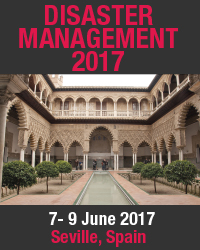Disaster Management 2017
5th International Conference on Disaster Management and Human Health: Reducing Risk, Improving Outcomes
![]()
7 - 9 June, 2017
Seville, Spain
Overview

The 2017 International Conference on Disaster Management and Human Health: Reducing Risk, Improving Outcomes, took place in Seville organized by the Wessex Institute. It was the 5th in this Series of conferences, following previous successful meetings held in the New Forest, UK in 2009; the University of Central Florida, USA in 2011; A Coruña, Spain in 2013; and Instanbul Technical University, Turkey in 2015.
The Series originated with the need for academia and practitioners to exchange knowledge and experience on how to handle the increasing risk of natural and man-made disasters. Recent major earthquakes, tsunamis, hurricanes, floods and other natural phenomena have resulted in huge losses in terms of human life and destruction of property. A new range of man-made disasters continues to afflict humanity in modern times; terrorist activities have been added to more classical disasters such as those due to the failure of industrial installations for instance.
It is important to understand the nature of these global risks in order to be able to develop strategies to prepare for these events and plan effective responses in terms of disaster management and the associated human health impacts.
Seville was a most suitable location for the event. The city is more tan 2000 years old and has a distinct personality and a large and well-preserved historical center. The old town contains three world heritage sites: the Minaret of La Giralda, the General Archives of the Indies and the Alcazar Palace. The city is home to many convents, churches, palaces, museums and public gardens. Also, on the occasion of the Universal Exhibition, several modern bridges designed by world known civil engineers were built including the Barqueta by Juan Jose Arenas and the Alamillo by Santiago Calatrava.
Opening the Conference
The Conference was opened by Santiago Hernandez, Professor and member of the Board of Directors of the Wessex Institute. On behalf of Professor Carlos A. Brebbia, he welcomed the attendants, explained the objectives of the meeting and mentioned the large number of delegates attending from many different countries, which is proof of the relevance of the topics discussed at the meeting. He also said that the quality of the papers accepted was a promise of an excellent event. Santiago gave a presentation of the Wessex Institute, narrating the broad range of activities that include research projects on different topics, publication of journals in several scientific fields and also its time-honored experience in the organization of international conferences, which started more than 30 years ago. These conferences contribute very efficiently to bringing together relevant specialists from academia and industry who present the most up to date achievements for the benefit of the delegates.
The contents of these contributions are then published in a range of Journals and Transactions, edited by WIT. All papers are now available in open access form in the Wessex Institute’s eLibrary, thus helping to achieve rapid dissemination of the work presented at our conferences.
WIT originated from a research group at the University of Southampton and is recognised as the creator of the Boundary Elements Method (BEM), a numerical technique initially devoted to engineering analysis but which, due to the enhancements developed by the Institute, can nowadays be used for a vast range of practical applications.
Santiago also explained that WIT welcomes postdoctoral researchers who can spend a year or so working on their research at the Institute, benefitting from the excellent facilities and the peaceful and beautiful surroundings of the Institute.
Invited Presentations
Three invited lectures were given at the conference, dealing with challenging issues:
- Professor Irina Malkina-Pikh, from the Russian Academy of Sciences presented a paper entitled “Generalised multiplicative model for predecting post-traumatic stress disorder after natural disasters: theoretical considerations”.
- Professor Vicenzo Ferrara, from the University of La Sapienza, Italy, presented a contribution on “Pervasive technologies for the reduction of disaster consequences: opportunities and questions.
- Professor Tanya Corbin from Radford University, USA, delivered the results of her work in “Lessons learned after disaster? Emergency shelters and housing policy after hurricane Katrina”
Conference Topics
The papers were divided in a series of sessions under the following headings:
- Disaster analysis
- Case studies
- Health risk and disaster phychology
- Multi-hazard risk assessment
- Emergence preparedness
- Community resilience
- Socio-economic issues
- Prepapedness and training
- Risk communications
Special Session by Prof. Tanya Cornin from Ratford University, USA
A Special Session on “Community and governmental approaches to disasters” chaired by Prof. T. Corbin was held on the third day of the conference, consisting of four presentations that discussed how administration and social bodies can learn from extreme events and disasters to allow them to improve their preparedness for future challenges of this type.
Activities
The delegates had many oportunities to network and discuss problems of common interest during the coffee breaks, lunches and social occasions, in addition to the formal sessions.
Conference Dinner
The Conference Banquet took place at El Palacio Andaluz, a place that combines a restaurant and a flamenco music show. There the delegates, in addition to tasting of the typical Andalucian gastronomy, enjoyed a performance with singers, guitar players and flamenco dancers, comprising a group of 20 people on stage. The quality of the show and the friendly atmosphere helped to strengthen the links among the conference delegates.
Closing of the Conference
The Conference was closed by Prof. Santiago Hernandez, on behalf of Prof. Carlos A. Brebbia, Chairman of the event and Director of the Wessex Institute. He thanked the delegates for their contribution to the success of the meeting.

 Wessex Institute
Wessex Institute